About
Quick Facts about Acne
- Acne affects 40-50 million people in the U.S. making it the most common skin disorder.
- Acne has a strong correlation to heredity. If at least one parent experienced acne, the children likely will, as well.
- Adult acne is becoming increasingly common in women ranging in age from 20-50 years old.
Acne is a condition in which the body's hair follicles become plugged with oil, dead skin cells, or bacteria; this leads to inflammation and outbreaks of lesions. The excess sebum, or oil, production, which is profoundly influenced by hormones, is the primary cause of acne.
Acne breakouts can occur on the face, neck, chest, shoulders, and back because these areas contain the highest concentration of active sebaceous, or oil, glands. Acne can come in the form of inflammatory and noninflammatory lesions.
Identifying Acne
Although acne varies from person to person, it can be divided into different categories based on type and severity. The physical emergence of acne is classified into two categories, noninflammatory lesions and inflammatory lesions. The descriptions of the different types are described below.
Acne is also characterized by the point in life in which it is experienced and includes the following groups: adolescent acne, persistent acne, and late-onset acne.
Continue reading the next section to learn more about the hormonal and non-hormonal causes of acne.
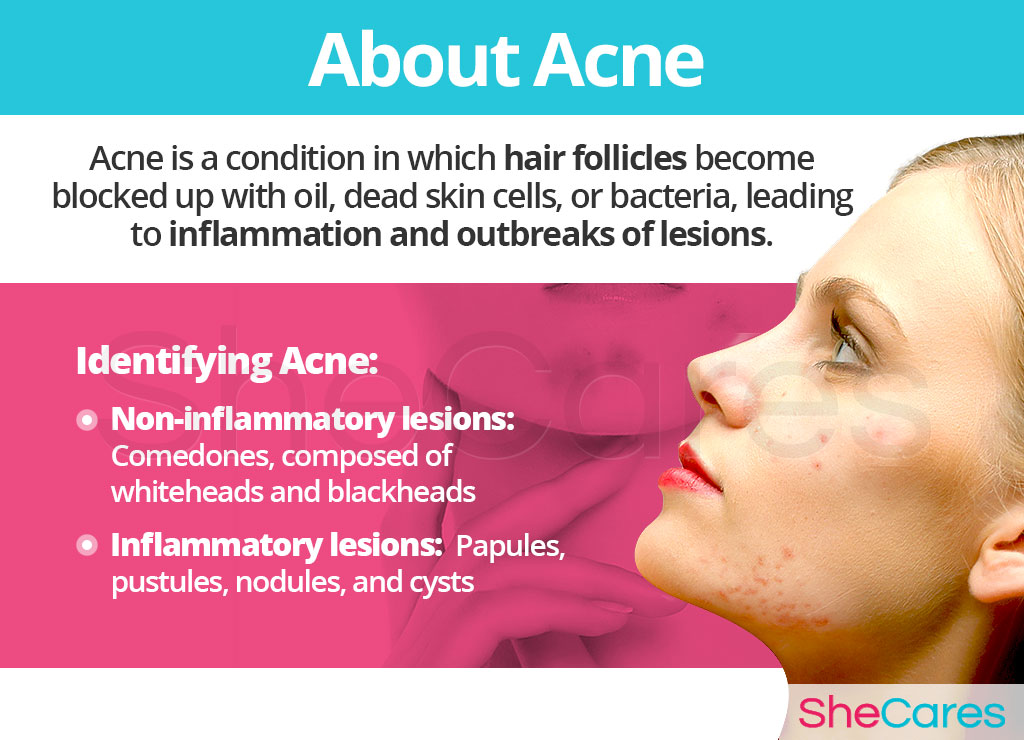
Causes
Acne has a strong correlation to hormonal changes; if male and female hormones aren't properly balanced in the body, acne can occur. Women are especially vulnerable to these changes as they are related to the significant reproductive phases that occur throughout their lives.
There are additional factors that may cause acne to arise. Acne can be a symptom of another more serious condition or simply the result of hereditary factors. Continue reading to learn about all the causes of acne.
Hormonal Causes of Acne
Hormones are chemical messengers that transmit information to all of the body's organs. When hormonal changes take place, organs receive the incorrect signals for proper functioning. This results in hormonal disorders. Acne is one of the most common hormonal disorders in women; it is typically caused by the hormonal fluctuations that take place during the significant transitions that women experience throughout their reproductive lives during puberty, pregnancy, post-partum, and menopause.
Androgens are male sex hormones that are present in both sexes, though men typically possess them in greater quantities. However, these hormones have a significant role in the changes that occur during the stages of reproductive lives of women. An increase in androgens in the body causes growth and overstimulation of the oil glands; excess sebum production is the most common cause of acne.
Hormonal Causes during Different Phases in a Woman's Life
Puberty is the stage in which a girl's body begins to produce reproductive hormones; these and other factors, such as birth defects or slower physical development, can contribute to acne during puberty.
Pregnancy leads to extreme changes in the production of reproductive hormones, which along with other factors, like fatigue or bodily changes, can lead to acne.
Postpartum and breastfeeding is another stage where reproductive hormones are unbalanced, leading to symptoms such as acne.
During menopause, the woman's body prepares for the end of its fertile days. This process will result in a gradual decrease in the production of estrogen and progesterone hormones.
Other Common Causes of Acne
While hormonal imbalance is a common cause of acne during a woman's life, experts also stress the fact that acne may be caused by other underlying conditions, including polycystic ovarian syndrome, diabetes, and adrenal hyperplasia.
Keep reading to learn about the risk factors and triggers that have a profound effect on a woman's experience of this skin condition.
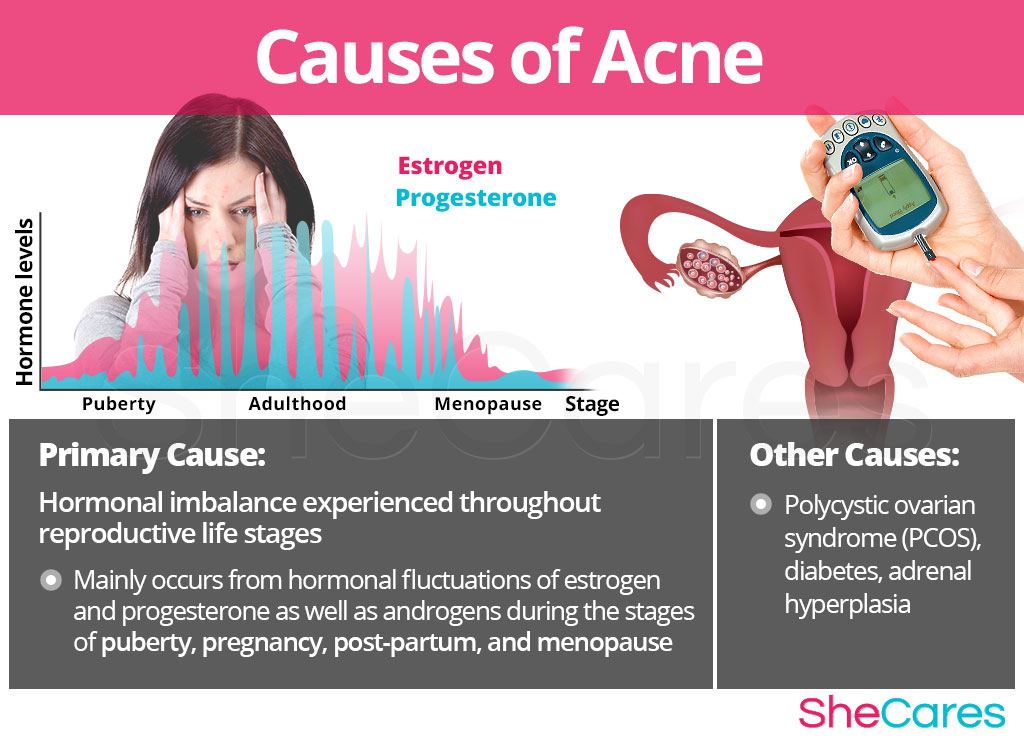
Risk Factors and Triggers
Risk Factors for Acne
Throughout a woman's life, there are particular times when there is a greater chance of developing acne. Such times include puberty, pregnancy, post partum, and menopause due to the hormonal changes that take place. Additionally, there are a number of health factors that may influence a woman's hormone levels and increase her chances of experiencing breakouts.
Some women are more likely than others to suffer from acne due to inherent psychological, behavioral, and health reasons, including stress and certain medical conditions. These predisposing factors can affect a woman's hormone levels and increase the chances of developing acne during her reproductive life.
Triggers of Acne
In addition to long-term risk factors, acne can also be triggered by environmental circumstances and behavioral practices. Avoiding the following habits as much as possible may be helpful in the prevention of breakouts.
Continue reading to discover the signs and symptoms of acne to be able to choose a treatment specific to its cause.
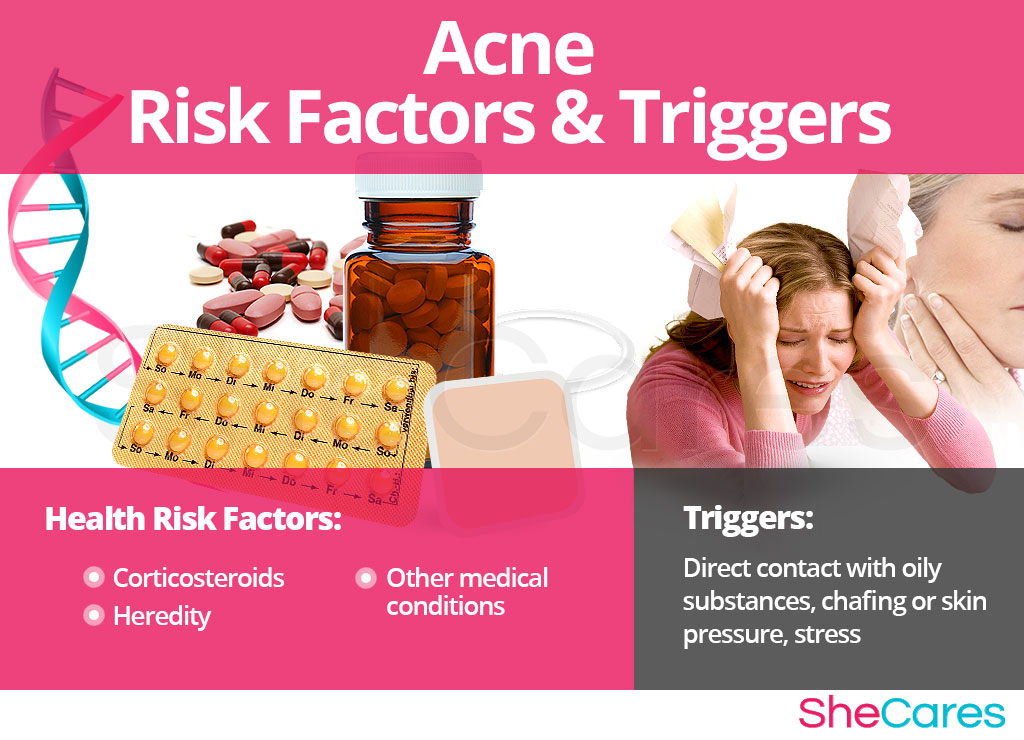
Signs and Symptoms
Acne generally manifests itself through physical symptoms. These symptoms may appear anywhere on the skin, but are typically found on the face, back, and chest.
In addition to the general symptoms, there are also medical signs that may be analyzed by a doctor to confirm diagnosis and recommend proper treatment. Keep reading to learn more about the symptoms and medical signs related to acne.
Common Symptoms of Acne
Acne symptoms will be evident in any of the previously mentioned commonly affected areas and are distinguished by their physical appearance.
- Grade I. This type of acne includes minor pimples without any inflammation, whiteheads, and blackheads. Grade I acne is often successfully managed with over the counter treatments.
- Grade II. This form of acne includes widespread whiteheads, blackheads, papules, and pustules. Over-the-counter treatments may provide successful management of these breakouts, but, more often than not, treatment from a primary care physician or dermatologist is required to address the problem. Grade II acne is also referred to as moderate acne.
- Grade III. This kind of acne is characterized by widespread and inflamed pustules, and papules, as well as nodular acne. This is also known as moderate to severe acne.
- Grade IV. This sort of acne includes whiteheads; blackheads; inflamed pustules; and nodular and cystic acne. Grade IV acne is more commonly known as severe acne.
Signs of Acne
As opposed to more noticeable symptoms, medical signs are measurable criteria that are usually assessed by a physician. The following medical signs will most likely be taken into account by a physician when diagnosing the disorder:
- Androgen levels. While androgen levels are normal in most women, hormonal testing should be conducted in women who have acne and experience any of the following: voice deepening, excessive hair growth on the face or body, and irregular or infrequent menstrual periods.
- Time and duration of symptoms. If acne is inconsistent, it may be helpful to monitor when breakouts occur and the length of episodes to identify their cause and severity. For example, acne during puberty, before and during menstruation, and throughout pregnancy may simply be the result of a natural, hormonal imbalance.
Diagnosis
To identify and diagnose acne, a dermatologist will typically review the patient's medical history and complete a brief physical examination. They will also inspect the affected area. Then, the doctor may order additional tests, if necessary.
- Medical history. A doctor's diagnosis will focus on discovering the underlying condition that is causing the acne. To assess whether a woman's acne is symptomatic of a hormonal issue or another health concern, a doctor may ask about previous medical conditions, any medication being taken, and current life events (e.g., entering puberty, becoming pregnant, or beginning or ending menopause).
- A physical examination. This will often be necessary for a doctor to make a diagnosis. During this exam, a woman can expect the following information to be taken: blood pressure, heart rate, temperature, and weight. The doctor will then examine the patient's acne to assess the best course of treatment.
- Tests. These conducted may include those that monitor hormone levels, specifically androgens, in the body.
Complications of Acne
Acne is a normal part of the hormonal changes associated with a woman's menstrual cycle and various life stages. Although acne itself is not a grave or life-threatening condition, there are a few possible complications. These complications of acne can include permanent scarring and emotional distress.
Many women who experience acne may wish to treat or prevent breakouts altogether. Keep reading below to learn more about how to prevent and manage acne.
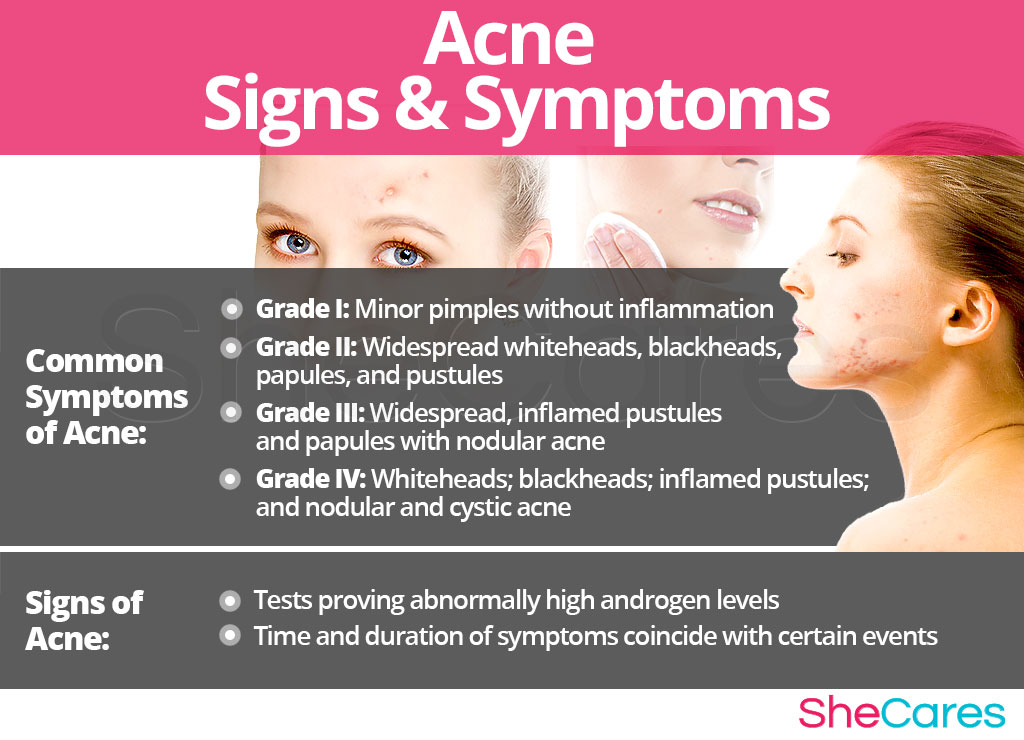
Prevention and Management
Preventing Acne
While there is no single way to completely prevent acne, just as there is no way to stave off natural hormonal processes, there are a few steps that a woman can take to lessen her chances of developing it, or to minimize the frequency of breakouts.
Lifestyle changes for prevention are extremely important, especially with regard to diet, exercise, and healthy habits. Moreover, a woman may seek ways to complement these lifestyle approaches with the use of supplements that help enhance overall skin health and, therefore, help to prevent or ease the symptoms of hormonal imbalance such as acne.
For women who are already experiencing acne, prevention may not be possible. Fortunately, there are many ways to manage these outbreaks in order to prevent further breakouts or to lessen the intensity of the symptoms. Keep reading to learn about the different ways to manage acne.
Managing Acne
The steps that one takes when experiencing acne may either promote healing or make the condition worse. There are ways to increase healing time and prevent further damage to the skin. Making small changes and avoiding triggers can make a tremendous difference in managing acne. There are general tips that women of all ages can use, such as washing the face two times each day, avoiding harsh irritants, or using products that contain salicylic acid and benzoyl peroxide.
While these measures often help to reduce the frequency and intensity of acne breakouts, they are unable to treat a common root of the problem, which is hormonal imbalance. However, there are several natural treatments that can treat these hormonal causes. Continue to the next section to learn more about acne treatment options.
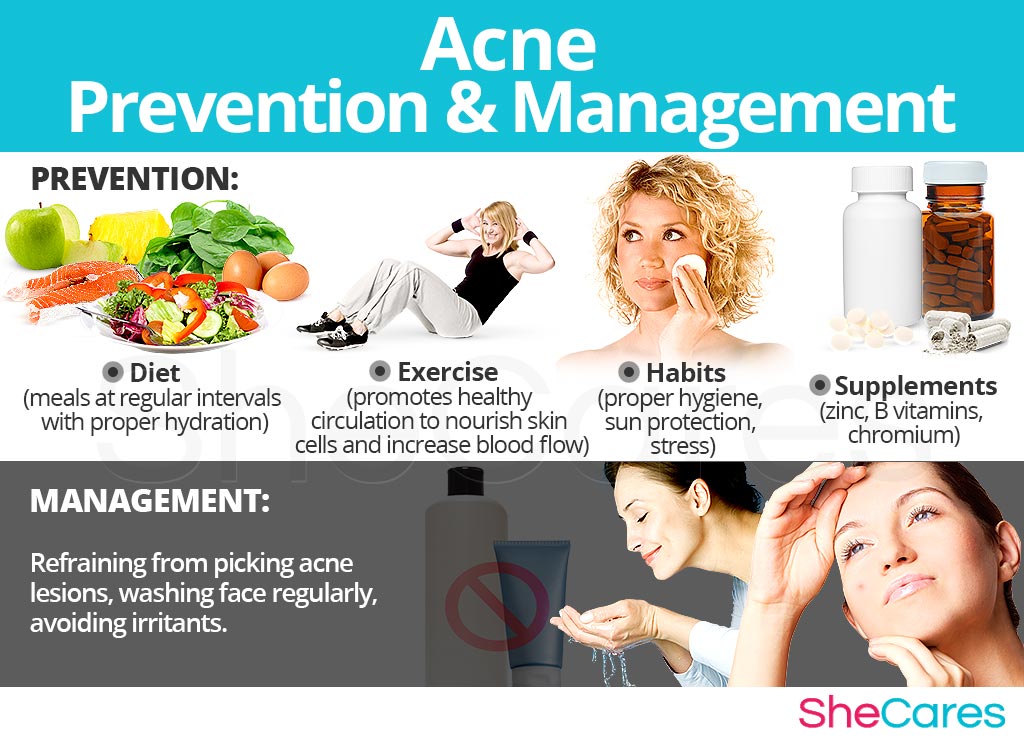
Treatments
Acne, a common consequence of hormonal imbalance, can be frustrating for any woman who experiences it; however, some cases of acne are so severe that they begin to interfere with daily life. Fortunately, it is possible to find an effective treatment.
Three Approaches to Treat Acne
Three levels of approaches can be considered for treating acne. These are categorized as: (1) Lifestyle Changes, (2) Alternative Medicine, and (3) Pharmaceutical Options.
Women are encouraged to begin with the least risky approach to acne treatment, lifestyle adjustments. While they are often effective at curbing the symptoms, these alone do little to address a common cause of acne in women - hormonal imbalance. Fortunately, alternative medicine can be combined with lifestyle changes to provide a safe and effective treatment.
While medical intervention is not usually necessary to treat acne, some women may wish to consider pharmaceutical or surgical options if they are unable to find relief from natural treatments. For women considering this option, it is important to understand, and carefully weigh out, the risks associated with this form of acne treatment.
Lifestyle Changes for Acne
This primary level of treatment involves the least amount of risk, though conversely it requires the highest amount of self-discipline. Often simple changes in lifestyle can reap huge benefits in fighting acne, and achieving a higher overall level of health. Fundamentally, an improved diet, regular exercise, and healthy habits can do a woman great service.
While these changes may help alleviate breakout symptoms, they do not directly address hormonal imbalance - one of the most common causes of acne; therefore, further treatment may be necessary. Alternative medicine has proven to be an excellent way of treating acne related to hormonal imbalance in a safe and natural way.
Alternative Treatments
Alternative medicines and supplements involve little to no risk and can be an extremely effective way to treat acne. In the case of herbal supplements, there are two main types that can be used: phytoestrogenic and hormone-regulating herbal supplements.
Phytoestrogenic herbal supplements
These supplements, such as black cohosh, contain estrogenic components produced by plants that complement the low estrogen levels in a woman's body, helping alleviate acne symptoms. By introducing plant-based estrogens into the body, these herbs treat the underlying hormonal imbalance behind acne.
They are mainly effective for menopausal women who are more likely to have low estrogen levels but are not necessarily effective for women in other stages of life such as puberty.
Hormone-regulating herbal supplements
These supplements, including Macafem, stimulate the body's natural hormone production by nourishing the pituitary and endocrine glands, helping the whole hormonal system produce hormones more efficiently. This ultimately results in balancing not only estrogen but other important hormones such as progesterone.
These supplements can be considered the safest and most natural way to treat the underlying hormonal imbalance behind acne, and can be taken throughout a woman's life, as they support the body's natural hormone production.
Additionally, there are some other types of supplements that can also alleviate acne, or at least make it more manageable, including natural oils and other herbal supplements.
Always speak to a doctor before trying a new treatment plan. These alternative treatments may negatively impact one's wellbeing as they do carry potential side effects.
Pharmaceutical Options for Acne
Treatments at this level involve the greatest risk and often the highest costs. Not all treatments are suitable for women at every life stage. So it is strongly recommended to speak to a qualified healthcare professional before starting any pharmaceutical treatments for acne.
The pharmaceutical options that can be prescribed to treat acne include prescription topical treatments, antibiotics, isotretinoin, oral contraceptive pills, laser therapies, and cosmetic procedures.
One may not see results from acne treatment for six to eight weeks and acne may get worse before it gets better. For optimal results, continue with the prescribed method of treatment for the recommended duration and contact a doctor or dermatologist if the condition still does not improve.
These three approaches are not mutually exclusive. A woman may use different approaches at different times or any combination of them, depending on the duration and severity of symptoms. Today, more and more women find that dealing with acne symptoms is best accomplished via a combination of healthy lifestyle and alternative treatments.
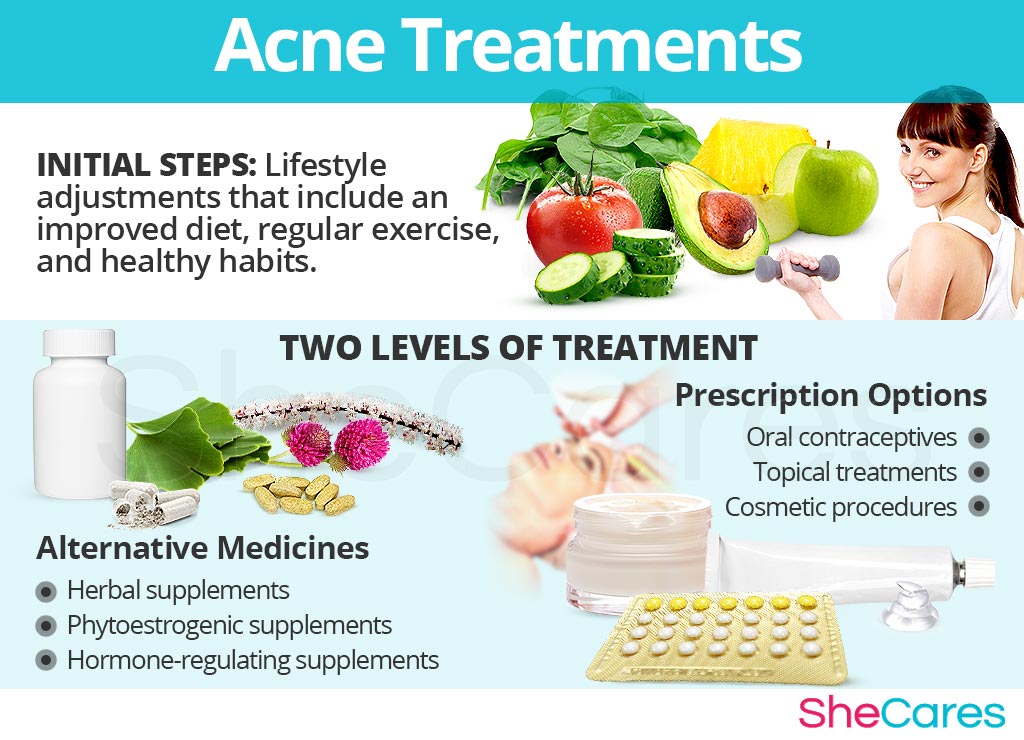
Sources
- American Academy of Dermatology. (2012). Hormonal factors key to understanding acne in women. Retrieved October 9, 2017, from https://www.aad.org/media/news-releases/hormonal-factors-key-to-understanding-acne-in-women
- American Pregnancy Association. (n.d.). Exercise and Pregnancy. Retrieved October 10, 2017, from http://americanpregnancy.org/pregnancy-health/exercise-and-pregnancy/
- Better Health Channel. (2016). Acne. Retrieved August 24, 2017, from https://www.betterhealth.vic.gov.au/health/conditionsandtreatments/acne
- Cheung, T. (1999). Androgen Disorders in Women: The Most Neglected Hormone Problem. California: Hunter House Publishers. Available from Google Books.
- Mayo Clinic. (n.d.). Acne: Symptoms | Causes | Risk Factors. Retrieved October 9, 2017, from http://www.mayoclinic.org/diseases-conditions/acne/basics/symptoms/con-20020580 | http://www.mayoclinic.org/diseases-conditions/acne/basics/causes/con-20020580 | http://www.mayoclinic.org/diseases-conditions/acne/basics/risk-factors/con-20020580
- National Institute of Arthritis and Musculoskeletal and Skin Diseases. (n.d.). Questions and Answers about Acne. Retrieved August 24, 2017, from https://www.niams.nih.gov/Health_Info/Acne/default.asp
- National Women's Health Resource Center. (n.d.). Androgen. Retrieved October 10, 2017, from http://www.healthywomen.org/condition/androgen
- Office on Women's Health, U.S. (2012). Acne. Retrieved August 24, 2017, from Retrieved August 24, 2017, from https://www.womenshealth.gov/a-z-topics/acne
- Schulman, R. (2007). Solve It With Supplements: The Best Herbal and Nutritional Supplements to Prevent and Heal More Than 100 Common Health Problems. New York: Rodale. Available from Google Books.
- Torpy, J.M. et al. (2004). Acne. JAMA, 292(6), 764. doi: 10.1001/jama.292.6.764
- U.S National Library of Medicine. (2017). Acne. Retrieved August 24, 2017, from https://medlineplus.gov/acne.html
- U.S National Library of Medicine. (n.d.). Acne. Retrieved August 24, 2017, from https://www.ncbi.nlm.nih.gov/pubmedhealth/PMHT0025360/


